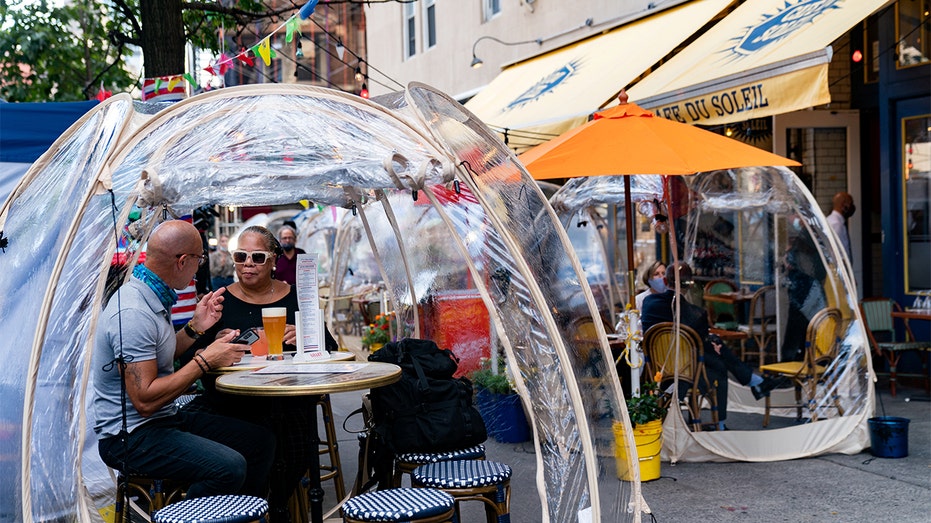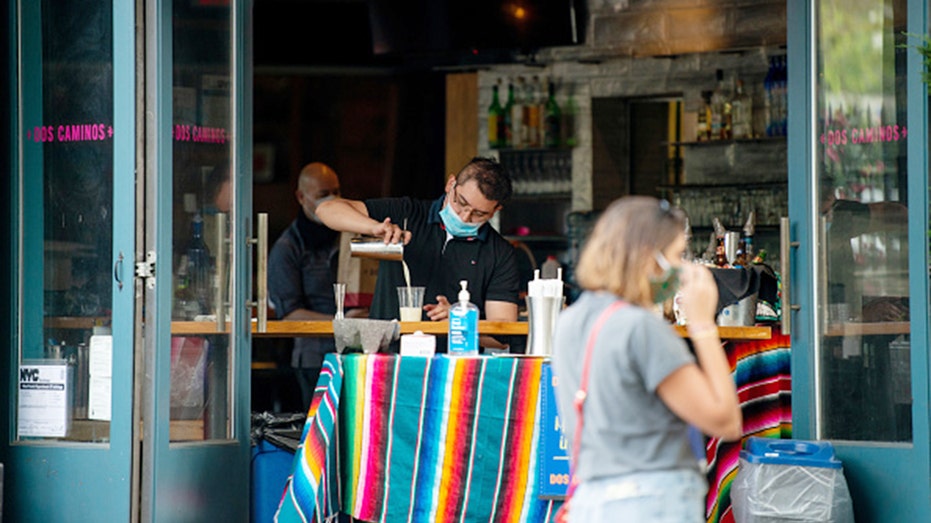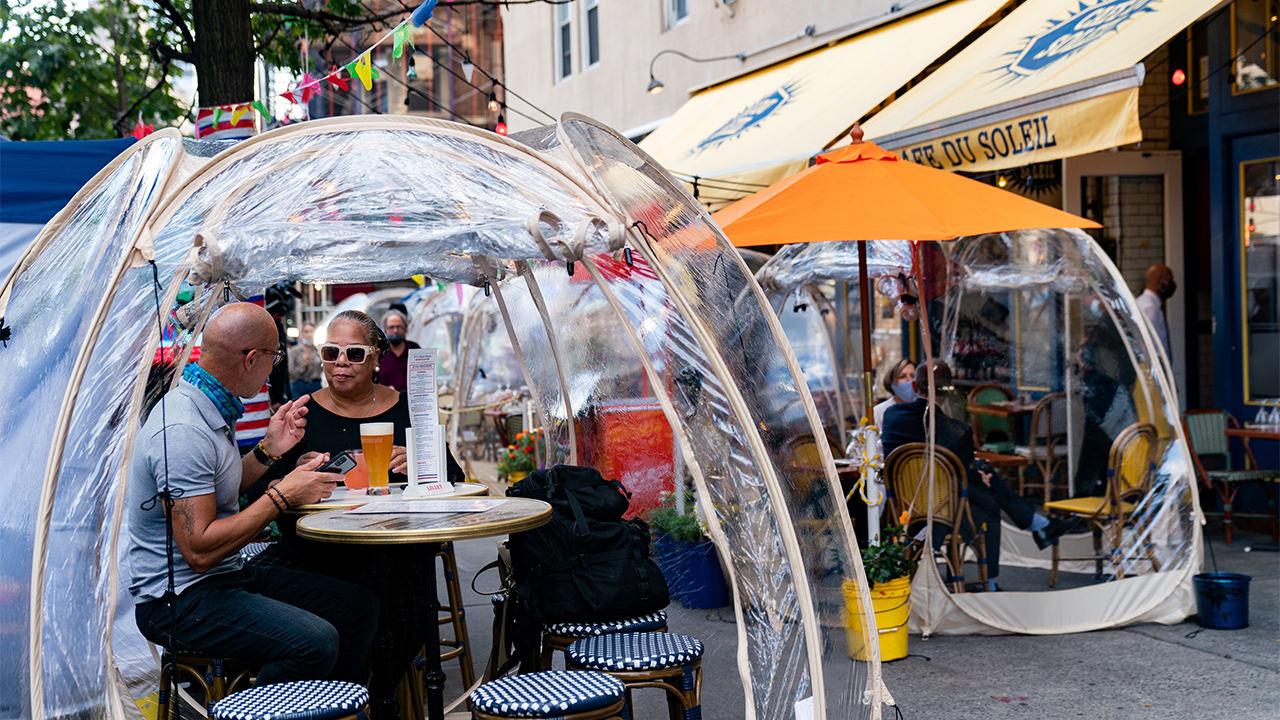Should I eat in an igloo? How to navigate restaurants' outside dining this winter
Public health experts answer questions as COVID-19 pandemic continues
From single-table igloos to communal tents, restaurants are counting on an array of outdoor structures to keep customers coming through the winter as the coronavirus pandemic continues. But are these enclosures safe from Covid-19 infection? We asked public-health experts.
Q: Is it safer to eat in a tent than a dining room?
A. It depends. A fully enclosed tent isn't much different than a room indoors. The key to preventing the spread of Covid-19, medical experts say, is a lot of air flow to avoid a buildup of droplets that carry the virus. Some local jurisdictions require that outdoor tents have at least two open sides. While that could make for a cold meal this winter in places like Chicago, it allows a level of air flow that epidemiologists say can ward off infection.
Windows in a tent aren't enough, said Lisa Brosseau, retired professor at the University of Illinois and an expert on respiratory protection and infectious disease. "You need to cause movement in and out of a space using something mechanical or some kind of air-movement device," she said. "Unless it is a windy day."
Medical experts say longer exposure to more of the new coronavirus is more likely to result in a person contracting Covid-19. But it is unclear what the threshold is for infection to take hold, said Richard Corsi, an air-quality expert at Portland State University.
By layering protective measures including masks, improved air flow and physical distancing, restaurants can limit a diner's potential exposure to Covid-19 by up to 95%, he said. Yet, Dr. Corsi, cautioned, restaurants and bars do present an elevated risk, even outdoors, because the piece of the puzzle that matters most -- having everyone wear masks -- isn't possible while eating and drinking.
A recent study in the U.K. funded by Parkrun, an organization that hosts 5K runs, reviewed 25,000 cases of Covid-19 infection and found very low risk of outdoor transmission of the virus. The study hasn't been peer-reviewed.

People sit outside Cafe Du Soleil under bubble tents following the outbreak of the coronavirus in New York City. ( REUTERS/Jeenah Moon)
RESTAURANTS ON LIFE SUPPORT WITH NEW CLOSURES, CURFEWS AND NO ADDITIONAL STIMULUS
Q: What about single-table igloos, yurts and dining pods?
A. These structures have been popping up across the country. The simple rule of thumb: Don't dine inside one with anyone you wouldn't feel safe with inside a phone booth. Igloos and dining yurts protect your party from others seated nearby, said Drs. Corsi and Brosseau. But if anyone inside your tiny restaurant turned out to have Covid-19, you would have actually heightened your exposure to the virus.
Q: If I dine inside an igloo or tent, what is restaurant staff doing to keep me safe?
A. American Express Co. and its reservation platform Resy Network Inc. set up yurts outside 13 restaurants across the country this week. Dining parties in the yurts are limited to six, and staff and guests will have their temperatures checked, the companies said. Many restaurants across the country are adding similar protocols. Crown Shy, a Manhattan restaurant that is part of the American Express partnership, said it plans to place a cabinet inside its yurts containing things that would normally need to be carried in and out of the kitchen, such as place settings for various courses, to reduce the number of times staff members need to enter the space.

A restaurant employee wearing a mask pours an alcoholic drink into a plastic cup. (Alexi Rosenfeld/Getty Images)
NYC ON VERGE OF ANOTHER INDOOR DINING SHUTDOWN AMID CORONAVIRUS SPIKE
Q: How much is the effort costing the restaurants?
A. A lot. Roger Berkowitz, president and chief executive of Legal Sea Foods, said renting a tent can cost between $1,800 and $2,500 weekly, depending on heating costs. Mr. Berkowitz said tables under tents are generating 60% of sales at Legal Sea Foods locations where they have been installed.
Restaurateur Jeff Katz at Crown Shy said that even with revenue from the outdoor yurts and assuming he continues to serve some diners inside, he expects to just manage to cover his bills through the winter.
"We have certainly put aside the idea of making any money," he said.
Q: What risks do waitstaff face serving diners in tents and igloos?
A. As temperatures have cooled, restaurant operators said staff have struggled to shuttle between the warmth of a restaurant and the frigid outdoors. And while diners inside an igloo or yurt might be comfortable with their exposure to one another, servers entering these spaces increase their potential exposure to the virus.
The U.S. Centers for Disease Control and Prevention recently updated its guidance to say that more than 15 minutes of exposure, even spread over a 24 hour period, could lead to infection. Health experts say the more restaurants can do to limit the number of times a server needs to enter an outdoor enclosure, the better. Speaking from a window outside the igloo or yurt, handing items to guests inside and using contactless menus and payments can all help, they say.
"The waiter should minimize the amount of time she spends in the tent, and she should always be wearing a mask that fully covers the nose and mouth," said Linsey Marr, a civil and environmental engineering professor at Virginia Tech and an expert in the airborne transmission of infectious disease.
GET FOX BUSINESS ON THE GO BY CLICKING HERE




















